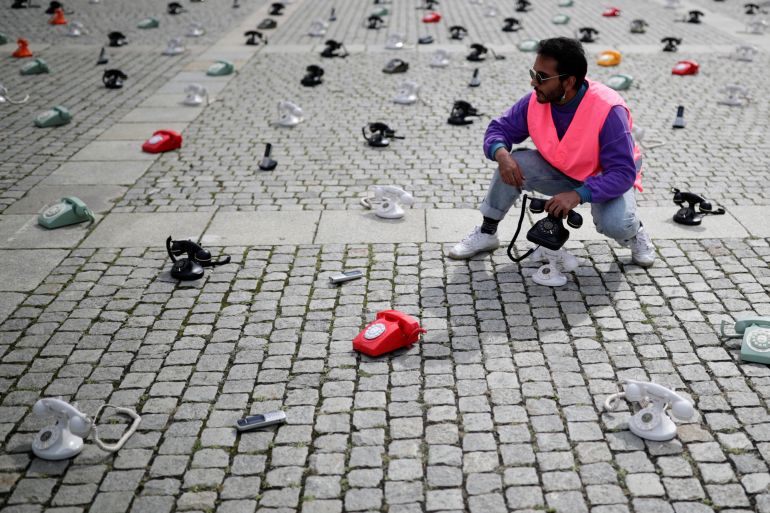The Commonwealth country has scheduled a referendum in 2024 on whether to cut ties to the British monarchy, opening up a debate on how to reshape the society.

By Emiliano Rodríguez Mega
May 6, 2023
As King Charles III put on the centuries-old St. Edward’s crown on Saturday, Jamaica, a Commonwealth member, continued to move ahead with plans to cut ties with the British monarchy — a decision scheduled for a referendum in 2024.
“Time has come. Jamaica in Jamaican hands,” Marlene Malahoo Forte, Jamaica’s minister for legal and constitutional affairs, said in an interview with Sky News this week. “Time to say goodbye.”
She is part of a 15-member committee of officials and experts that is laying the groundwork to modify Jamaica’s Constitution and remove the British monarch as the Caribbean island’s head of state.
Jamaica was also represented in a letter to King Charles this week in which campaigners from 12 Commonwealth nations urged him to use his coronation to apologize for the “horrific impacts” of Britain’s imperial past, including “racism, oppression, colonialism and slavery.” The letter called for reparations and the return of all stolen cultural artifacts.
“The British have a great opportunity” to address colonial injustices, said Rosalea Hamilton, co-signer of the letter and founding director of the Institute of Law and Economics, a nonprofit in Kingston, the Jamaican capital. “Having led the world with this inhumanity for centuries, they can lead the world in repairing the damage.”
More on BritainCoronation: King Charles III, Britain’s first new monarch in 70 years, was crowned at Westminster Abbey in London during an ancient ceremony that had a few modern touches.
Municipal Elections: Britain’s Conservative Party suffered sweeping losses in local elections, a stinging rejection of the status quo that raises doubts about its ability to hold onto power.
HSBC: Europe’s largest lender has a venerable place in Britain’s banking industry. Can it stay in one piece, as its biggest shareholder pushes to spin off the bank’s profitable Asian operation?
A Double Life: The execution in Iran of a former deputy defense minister on espionage charges brought to light the man’s role in providing Britain with valuable intelligence over a decade.
Although its practical role in the island’s affairs might be minute, the monarchy has left an uncomfortable legacy. All of the queen’s, and now the king’s, functions are performed by a governor general acting as their direct representative — assenting to all legislation and determining who becomes Prime Minister.
“Some people would tell you it’s largely ceremonial, but I think that’s the wrong way of thinking about it,” said Tracy Robinson, a constitutional law professor at the University of the West Indies. “It reflects the old prerogative power of the crown.”
On the British government’s part, Prime Minister Rishi Sunak has declined to apologize for the country’s role in the trans-Atlantic slave trade or to engage in discussions about paying reparations. “Trying to unpick our history is not the right way forward,” he told lawmakers in Britain’s Parliament in April, “and it’s not something that we will focus our energies on.”
Still, the constitutional reform process is prompting more people in Jamaica to think even beyond ditching the British monarch.
“When we say we wish to get rid of the monarchy, that tells you only the starting point,” Ms. Robinson said during a public panel this week. “It does not tell you the destination or where we’ll end up.”
Among the questions that loom: If Charles III is out as Jamaica’s head of state, what kind of political system would ensue?
“We’ve never quite asked and answered those questions before,” said Ms. Hamilton, who co-chairs the Advocates Network, an organization that has urged a national discussion around transitioning to a republic. “Can we, for the first time in our history, really conceive of reshaping the society in the interests of the majority?”
Clear answers are elusive. So far, the government’s committee — which has said that a draft bill will be presented to Parliament this month — has mostly met in private.
If the legislation is not drafted with significant public participation, said Maziki Thame, a researcher at the University of the West Indies, the decision-making could end up in the hands of a few. That would fall short of what many Jamaicans expect.
“Don’t get me wrong — I think it’s very important that you have our people in power,” she said. “At the same time, I want it to have substance as representative of a democratic move.”











